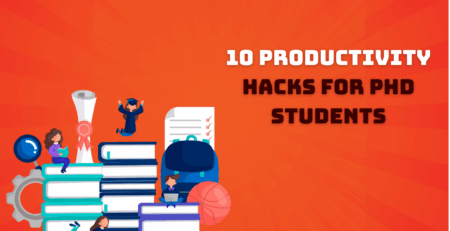Weekly Planning Hacks Every PhD Student Must Master in 2025
Kenfra Research - Bavithra2025-09-23T16:54:25+05:30PhD life is demanding. Between research deadlines, teaching, academic writing, and personal responsibilities, it’s easy to feel overwhelmed. That’s why weekly planning hacks are essential. They help you manage your workload effectively, reduce stress, and keep your focus on what really matters—finishing your research.
By adopting smart weekly planning hacks, PhD students in 2025 can stay ahead of deadlines, improve productivity, and maintain a balance between academic and personal life.
In this guide, you’ll discover PhD time management hacks, research planning strategies, and practical tools that will transform your weekly routine.
Why Weekly Planning Matters for PhD Students?
Many students assume productivity comes from working harder, but real progress comes from working smarter. Without academic weekly planning, you risk falling behind, missing deadlines, or struggling with burnout.
Benefits of structured weekly planning:
- Keeps you accountable.
- Breaks research into manageable tasks.
- Provides clarity and direction.
- Supports PhD student success tips and mental well-being.
A PhD isn’t just about research—it’s also about discipline. Weekly planning provides that discipline.
10 Weekly Planning Hacks for PhD Success
1. Break Down Research Into Weekly Goals
PhD research is a marathon, not a sprint. Large tasks like “Write literature review” feel overwhelming. Instead, break them into smaller weekly goals:
- Week 1: Collect 10 journal articles on your topic.
- Week 2: Summarize 5 key studies.
- Week 3: Write the introduction draft.
This approach reflects effective study planning for PhD and keeps progress measurable.
2. Time Blocking for Deep Work
The time blocking strategy for PhD students is powerful. It involves dividing your day into fixed blocks and dedicating each to a single activity:
- 8–10 AM: Data analysis.
- 10–12 PM: Writing.
- 2–4 PM: Reading and note-taking.
This system prevents multitasking and enhances focus. It’s one of the most effective PhD productivity tips for 2025.
3. Use Digital Tools for Weekly Scheduling
Technology makes academic planning easier than ever. Instead of relying on paper planners, use digital tools:
- Notion: Organize research notes, create weekly dashboards.
- Trello: Visual task boards to track progress.
- Google Calendar: Time-block meetings, deadlines, and reminders.
These apps act as weekly planner tools for PhD students in 2025, ensuring that no task slips through the cracks.
4. Prioritize with the Eisenhower Matrix
PhD students often juggle multiple tasks. To prevent confusion, apply the Eisenhower Matrix:
- Urgent & Important: Chapter deadline, supervisor meetings.
- Important, Not Urgent: Reading background material.
- Urgent, Not Important: Departmental emails.
- Not Urgent, Not Important: Social media distractions.
By sorting tasks this way, you sharpen your PhD time management skills and focus on what matters most.
5. Weekly Reflection and Adjustment
At the end of each week, reflect:
- What did I accomplish?
- Where did I fall short?
- How can I adjust next week?
This self-checking habit improves weekly schedule hacks for doctoral research and prevents repeating mistakes.
6. Align Academic and Personal Growth
PhD students often sacrifice personal growth. But balance fuels higher education productivity.
Include in your weekly plan:
- Fitness or yoga sessions.
- Networking opportunities.
- Professional development (workshops, webinars).
Remember: Academic growth thrives when supported by personal well-being.

7. Beat Procrastination with Micro-Tasks
Procrastination is the enemy of progress. Overcome it by creating micro-tasks.
Instead of: “Write Methodology Chapter.”
Try: “Write 200 words on data collection.”
This technique, part of student productivity hacks, makes tasks less intimidating and keeps momentum flowing.
8. Weekly Goal-Setting for Long-Term Success
SMART goals (Specific, Measurable, Achievable, Relevant, Time-bound) should guide your weekly schedule:
- Draft one section of your thesis.
- Submit a research abstract.
- Prepare 3 slides for your upcoming presentation.
This type of weekly goal setting for PhD research ensures your efforts connect with bigger milestones.
9. Accountability and Peer Support
Accountability accelerates progress. Share your weekly plan with:
- A research partner.
- A study group.
- An online PhD forum.
This peer system not only provides motivation but also introduces constructive feedback. Knowing that someone else is aware of your goals can create a sense of responsibility, turning your study schedule tips into actionable results and ensuring consistent progress.
10. Keep Flexibility in Your Weekly Plan
Even the best plans face disruptions—supervisor meetings, last-minute reviews, or unexpected deadlines. That’s why planning tips for PhD students should always include buffer time.
Flexibility allows you to adapt without feeling stressed, maintain consistent progress on research, and prevent burnout. Think of it as your “academic insurance,” giving you the freedom to adjust while still achieving your weekly goals efficiently.
Conclusion
Adopting weekly planning hacks in 2025 is more than just staying organized—it’s a pathway to research excellence and personal balance. By applying PhD time management hacks, leveraging academic weekly planning tools, and following research planning strategies, you’ll steadily move toward thesis completion and academic success.
Remember, PhD success comes not from working endlessly, but from working wisely.











Leave a Reply